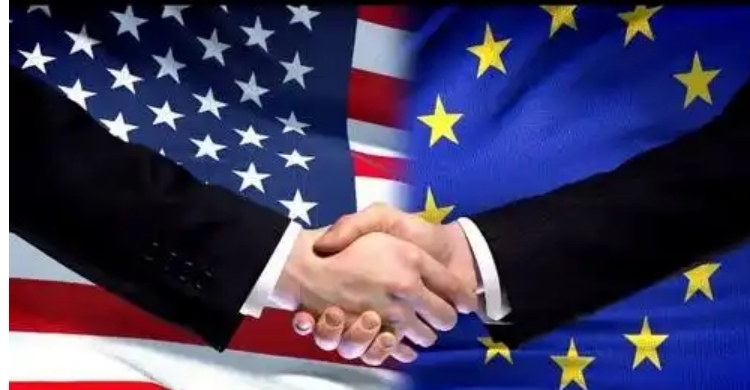
Recently, the tariff negotiations between Europe and the United States have become a focal topic in the international economic field. On June 19th, it was reported that the EU is gradually accepting a 10% reciprocal tariff as the benchmark for trade negotiations between the US and the EU. However, the US Commerce Secretary stated directly that this is the bottom line. What is more tense is that if the two sides fail to reach an agreement before July 9th, the EU's tariffs on US exports will soar from 10% to 50%. Currently, the attitude within the EU towards this is divided.
From the perspective of the negotiation background, Europe and the United States, as the two major economies in the world, have frequent trade exchanges. For a long time, the two sides have had many differences in the field of trade, such as agricultural product standards, digital service taxes, tariffs on steel, aluminum and automobiles, etc. The United States has been accusing the European Union of setting up trade barriers, resulting in a trade deficit for the United States. The European Union believes that the tariff policy of the United States is unreasonable and has harmed the interests of European enterprises. This negotiation was carried out under such accumulated contradictions, aiming to ease trade frictions and restructure the trade order between the two sides.
During the negotiation process, although there has been some progress so far, the key tariff issue remains unresolved. The United States has put forward a series of demands, including the EU stopping the imposition of the digital services tax, lifting the ban on US imports of food such as chlorinated chicken, and eliminating "non-trade barriers" in areas such as TV program production quotas. The European Union has proposed to purchase more US-made liquefied natural gas and weapons in order to reduce its annual trade surplus of 198 billion euros with the United States. Previously, the United States had also threatened to impose a 50% uniform tariff on the European Union. Later, it extended the starting date from June 1st to July 9th. During this period, the two sides engaged in intensive negotiations.
The differences in attitudes within the European Union have also added complexity to the negotiations. According to the Financial Times of the UK, at present, the voices within the EU demanding countermeasures against the US have waned. Some governments are worried about the economic consequences of retaliating against the US and the risk of divisions within the EU on countermeasures. Countries such as France hope to take "reciprocal retaliation", while countries such as Italy and Hungary hope to continue negotiations, mainly worried that the United States threatens to impose 200% tariffs on wine and whisky. German Minister of Economy and Energy Reacher said that he hopes an agreement can be reached before the July 9 deadline, as the current conflict is causing millions of euros in losses to the German economy every day and the uncertainty must end quickly.
If the negotiations fail, it will have a significant impact on both Europe and the United States as well as the global economy. For the European Union, once tariffs soar, key industries such as pharmaceuticals, automobiles and aviation that export to the United States will be severely hit. In 2024, the total export volume of the European Union to the United States will reach 530 billion euros, accounting for more than 20% of all the EU's external sales. The Kiel Institute for the World Economy, a German economic research institution, estimates that the relevant measures will lead to a 20% decline in the EU's exports to the United States in the short term. From the perspective of the United States, raising tariffs will intensify the pressure of rising domestic prices and shortages of goods, leading to a slowdown in economic growth. Gary Hefbauer, a senior fellow at the Peterson Institute for International Economics in the United States, said that a 50% tariff on Europe will drag down the US economic growth by at least 0.2 percentage points this year. In addition, the escalation of trade frictions between Europe and the United States will also undermine the stability of the global supply chain, affect the international trade order, and bring more uncertainties to the global economic recovery.
At present, as the July 9th deadline approaches, the two sides of Europe and the United States are still in intense negotiations. The international community is closely following the outcome of the negotiations, hoping that the two sides can reach a mutually beneficial and win-win agreement, avoid the outbreak of a tariff war, and inject confidence into the stability of the global economy. After all, in the context of economic globalization, the cooperation between the two major economies of Europe and the United States is far more in line with the interests of both sides and the world than confrontation.

报告显示,中国电力投资加速增长,预计2024年电网基建投资将超过5300亿元。
近日,市场迎来了一则引人注目的消息:工业巨头3M公司(MMM.N)在本周五公布了其季度业绩报告,随后股价飙升至近两年来的
最近,外媒给OpenAI算了笔账,今年可能要血亏50亿美元。
近日,巴黎奥运会和世界铁人三项协会联合发布了一项重大决定,宣布因塞纳河水质污染问题,原定于近期进行的奥运会铁人三项首次下
当地时间7月18日,法国巴黎发生了一起令人震惊的持刀袭警事件。
近期,一则重大消息在国际舞台上引起轩然大波,马来西亚宣布加入金砖国家。
调查发现,互联网和智能手机的使用干扰了韩国近五分之一学生的生活。